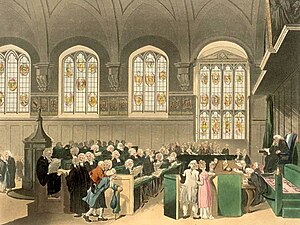Equity (law)
[4] In common law jurisdictions, the word "equity" "is not a synonym for 'general fairness' or 'natural justice'", but refers to "a particular body of rules that originated in a special system of courts".Over the course of the twentieth century some common law systems began to place less emphasis on the historical or institutional origin of substantive legal rules.[13] The latter part of the twentieth century saw increased debate over the utility of treating equity as a separate body of law.Litigants began to seek relief against unfair judgments of the common law courts by petitioning the King.Early Chancery pleadings vaguely invoked some sort of higher justice, such as with the formula "for the love of God and in way of charity".[29] What was new was the application of the word "equity" to "the extraordinary form of justice administered by the chancellor", as a convenient way to distinguish Chancery jurisprudence from the common law.[30] Complaints about equity as an arbitrary exercise of conscience by nonlawyer Chancellors became quite frequent under the chancellorship of Thomas Wolsey (1515–1529), who "had no legal training, and delighted in putting down lawyers".Litigants would go "jurisdiction shopping" and often would seek an equitable injunction prohibiting the enforcement of a common law court order.[23] The 1615 conflict between common law and equity came about because of a "clash of strong personalities" between Lord Chancellor Ellesmere and the Chief Justice of the King's Bench, Sir Edward Coke.[31] Chief Justice Coke began the practice of issuing writs of habeas corpus that required the release of people imprisoned for contempt of chancery orders.This tension reached a climax in the Earl of Oxford's case (1615) where a judgment of Chief Justice Coke was allegedly obtained by fraud.[34]After 1660, Chancery cases were regularly reported, several equitable doctrines developed, and equity started to evolve into a system of precedents like its common law cousin.[36] One indicator of equity's evolution into a coherent body of law was Lord Eldon's response to Selden in an 1818 chancery case: "I cannot agree that the doctrines of this court are to be changed with every succeeding judge.Nothing would inflict on me greater pain, in quitting this place, than the recollection that I had done anything to justify the reproach that the equity of this court varies like the Chancellor's foot.A string of cases in the 1980s saw the High Court of Australia re-affirm the continuing vitality of traditional equitable doctrines.[38] In 2009 the High Court affirmed the importance of equity and dismissed the suggestion that unjust enrichment has explanatory power in relation to traditional equitable doctrines such as subrogation.[41] Nevertheless, in 1975 three alumni of Sydney Law School and judges of the NSW Supreme Court, Roddy Meagher, William Gummow and John Lehane produced Equity: Doctrines & Remedies.Scholars such as Peter Birks and Andrew Burrows argue that in many cases the inclusion of the label "legal" or "equitable" before a substantive rule is often unnecessary.Limits on the power of equity in English law were clarified by the House of Lords in The Scaptrade case (Scandinavian Trading Tanker Co. A.B.v Flota Petrolera Ecuatoriana [1983] 2 AC 694, 700), where the notion that the court's jurisdiction to grant relief was "unlimited and unfettered" (per Lord Simon of Glaisdale in Shiloh Spinners Ltd v. Harding [1973] A.C. 691, 726) was rejected as a "beguiling heresy".[45] The nobile officium enables the Court to provide a legal remedy where statute or the common law are silent, and prevent mistakes in procedure or practice that would lead to injustice.On the other hand, if the plaintiff requests an injunction, declaratory judgment, specific performance, modification of contract, or some other non-monetary relief, the claim would usually be one in equity.
equitable remedyEquityCourt of Chancerycommon lawcourts of equitycivil lawinternational lawAristotleRoman lawaequitasEnglishCourt of King's BenchCourt of Common PleasExchequerJudicature Actsexpressresultingconstructive trustsfiduciary lawequitable estoppelpenaltiescontributionsubrogationmarshallingset-offEnglandmoney damagescourts of chanceryinjunctive reliefcourt ordertrustsNew Zealand Court of Appealunjust enrichmentlaw of unjust enrichmentHistory of equity and trustsNorman ConquestKing of EnglandChanceryLord ChancellorParliamentProvisions of Oxfordcuria regisform of actioncause of actionKeeper of the King's ConscienceFrancis Palgraveconsciencecanon lawlove of GodcharityThe Doctor and Studentstatutory interpretationaccording to the intentionThomas WolseyThomas WriothesleyAnthony Ashley Cooper, 1st Earl of ShaftesburyLiz TrussConstitutional Reform Act 2005Chancellor of the High Courtjurisdiction shoppinginjunctionEllesmereKing's BenchEdward Cokehabeas corpusEarl of Oxford's caseAttorney GeneralFrancis BaconKing James IJohn SeldenLord Eldonequitable interestsStatute of UsesHigh Court of AustraliaNew South WalesSydney Law SchoolRoddy MeagherWilliam GummowDyson HeydonMark LeemingNew South Wales Court of AppealCambridge UniversityEngland and WalesPeter BirksAndrew BurrowsOxfordCambridgeHouse of LordsLord Simon of Glaisdalecourts of ScotlandCourt of Sessioncivil courtScotlandinherent jurisdictionnobile officiumlegal remedystatuteinjusticeprecedentlegislationstatutory powerSpecific Relief ActParliament of IndiaLaw Commission of IndiacontractsInjunctionsCode of Civil Procedure, 1908civil courtsHigh CourtsSupreme Court of IndiaConstitution of Indiatrier of factjury trialSeventh Amendmentdeclaratory judgmentspecific performanceThomas Jeffersoncourt of equityWillard v. TayloecontractEmployee Retirement Income Security ActDavid Dudley Field IIField CodeFederal Rules of Civil ProcedureDelawareDelaware corporations